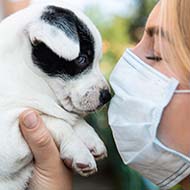
Rosie Bescoby speaks on how VNs can support owners.
Over the course of the COVID-19 pandemic, there has been an unprecedented rise in dog ownership - with more time at home, many new owners used their newfound time to purchase a 'pandemic puppy'.
Animal behaviourist Rosie Bescoby delivered a fascinating presentation on the impact of the COVID-19 pandemic on puppy ownership, and how veterinary nurses can confidently address 'puppy problems' in practice today (2 October) at the BVNA Congress in Telford.
Rosie began by discussing puppy purchasing, and how a puppy's early life can affect its behaviour. As she explained, the pandemic provided the “perfect smokescreen for unscrupulous breeders,” and the negative behavioural problems this can cause means that owners have more often been looking online for support.
She stressed that: “As people have been seeking a lot of advice online, the vet practice might be their only source of professional advice,” highlighting the importance of the veterinary nurses' role in providing advice and support.
Sharing a shocking statistic, Rosie told delegates that the number one cause of death in dogs under three years of age was euthanasia, with behavioural issues undoubtedly playing a significant role in this. However, as she explained, there are several ways that veterinary practices can advise and support owners with puppy behaviour.
Firstly Rosie explained how veterinary professionals should consider product recommendations and advice given to new puppy owners in terms of four 'pillars' of sustainability – economic, environmental, social and human. Some of her key advice here was:
- Advise owners to purchase puppy food that is environmentally friendly and nutritious, considering the clear link between the gut microbiome and the brain: “A healthy gut equals a healthy brain which equals more desirable behaviour.”
- Find the balance between advising owners not to breed their dog and signposting them to appropriate advice and research for long term client benefit.
- Advise a variety of different chews for different motivations and manage human response to stolen items to decrease the risk of adding value to items and encouraging possessive behaviour.
- Advising owners with regard to biting behaviour by suggesting dealing with the underlying emotion causing the behaviour, using appropriate play, toys and sleep schedule, and educating children in the home on how to interact appropriately with the puppy.
Importantly, Rosie also discussed handling procedures, and how veterinary nurses can teach puppies to be comfortable during veterinary visits, including advising owners to bring the puppy's toys and treats, using a lickimat, examining and treating the puppy outside if necessary, being aware of faffing or fiddling behaviours and using consent as much as physically possible in practice.
Rosie offered delegates ideas on the kind of services that practices can potentially offer to new and prospective puppy owners, including online consultations prior to purchase to advise on considerations breeds and finding a responsible breeder.
She also suggested remote puppy support consults and sessions, citing the digital nature of the way many owners now search for advice, and outreach sessions at places such as colleges, schools and dog shows.
Summarising her lecture, Rosie reminded delegates of the importance of their recommendations to puppy owners, and stressed that preventative advice and education has an economic advantage in the veterinary practice.
“Vet nurses are ideally positioned to provide support to owners to help prevent problems from developing, either remotely or potentially as outreach sessions.”



 The BSAVA has opened submissions for the BSAVA Clinical Research Abstracts 2026.
The BSAVA has opened submissions for the BSAVA Clinical Research Abstracts 2026.